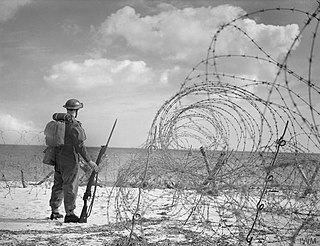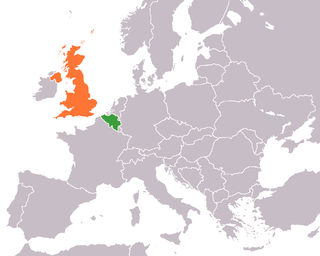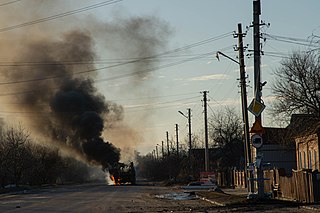
The Axis powers, originally called the Rome–Berlin Axis, was a military coalition that initiated World War II and fought against the Allies. Its principal members were Nazi Germany, the Kingdom of Italy, and the Empire of Japan. The Axis were united in their opposition to the Allies, but otherwise lacked comparable coordination and ideological cohesion.

The term Low Countries, also known as the Low Lands and historically called the Netherlands, Flanders, or Belgica, refers to a coastal lowland region in Northwestern Europe forming the lower basin of the Rhine–Meuse–Scheldt delta and consisting of Belgium, the Netherlands and Luxembourg. Geographically and historically, the area also includes parts of France and Germany such as the French Flanders and the German regions of East Frisia and Cleves. During the Middle Ages, the Low Countries were divided in numerous semi-independent principalities.

Significant opposition to the Iraq War occurred worldwide, both before and during the initial 2003 invasion of Iraq by a United States-led coalition, and throughout the subsequent occupation. People and groups opposing the war include the governments of many nations which did not take part in the invasion, and significant sections of the populace in those that did.

The Normandy landings were the landing operations and associated airborne operations on Tuesday, 6 June 1944 of the Allied invasion of Normandy in Operation Overlord during World War II. Codenamed Operation Neptune and often referred to as D-Day, it was the largest seaborne invasion in history. The operation began the liberation of France and laid the foundations of the Allied victory on the Western Front.

The invasion of Poland, also known as the September campaign, 1939 defensive war and Poland campaign, was an attack on the Republic of Poland by Nazi Germany and the Soviet Union which marked the beginning of World War II. The German invasion began on 1 September 1939, one week after the signing of the Molotov–Ribbentrop Pact between Germany and the Soviet Union, and one day after the Supreme Soviet of the Soviet Union had approved the pact. The Soviets invaded Poland on 17 September. The campaign ended on 6 October with Germany and the Soviet Union dividing and annexing the whole of Poland under the terms of the German–Soviet Frontier Treaty.

The Goodwill Games were an international sports competition created by Ted Turner in reaction to the political troubles surrounding the Olympic Games of the 1980s. In 1979, the Soviet invasion of Afghanistan caused the United States and other Western countries to boycott the 1980 Summer Olympics in Moscow, an act reciprocated when the Soviet Union and other Eastern Bloc countries boycotted the 1984 Summer Olympics in Los Angeles.

Wilhelm List was a German field marshal during World War II who was convicted of war crimes by a US Army tribunal after the war. List commanded the 14th Army in the invasion of Poland and the 12th Army in the invasions of France, Yugoslavia and Greece. In 1941 he commanded the German forces in Southeast Europe responsible for the occupation of Greece and Yugoslavia. In July 1942 during Case Blue, the German summer offensive in Southern Russia, he was appointed commander of Army Group A, responsible for the main thrust towards the Caucasus and Baku.

British anti-invasion preparations of the Second World War entailed a large-scale division of military and civilian mobilisation in response to the threat of invasion by German armed forces in 1940 and 1941. The British Army needed to recover from the defeat of the British Expeditionary Force in France, and 1.5 million men were enrolled as part-time soldiers in the Home Guard. The rapid construction of field fortifications transformed much of the United Kingdom, especially southern England, into a prepared battlefield. Sea Lion was never taken beyond the preliminary assembly of forces. Today, little remains of Britain's anti-invasion preparations; only reinforced concrete structures such as pillboxes and anti-tank cubes are commonly found.

Operation Overlord was the codename for the Battle of Normandy, the Allied operation that launched the successful invasion of German-occupied Western Europe during World War II. The operation was launched on 6 June 1944 with the Normandy Landings (D-Day). A 1,200-plane airborne assault preceded an amphibious assault involving more than 5,000 vessels. Nearly 160,000 troops crossed the English Channel on 6 June, and more than two million Allied troops were in France by the end of August.

The Republic of Molossia, also known as Molossia, is a micronation created for comedic value claiming sovereignty over 1.28 acres of land near Dayton, Nevada. It was founded by Kevin Baugh. The Republic of Molossia has claimed itself as a nation, though it is not recognized as a country by any recognized national government nor by the United Nations. On April 16, 2016, Baugh hosted a tour of Molossia, sponsored by the website Atlas Obscura. He continues to pay property taxes on the land to Storey County, although he calls it "foreign aid". He has stated "We all want to think we have our own country, but you know the U.S. is a lot bigger".

Belgium–United Kingdom relations are foreign relations between Belgium and the United Kingdom. Belgium has an embassy in London and 8 honorary consulates. The United Kingdom has an embassy in Brussels.
The following outline is provided as an overview of and topical guide to World War II:

The Polish crisis of 1980–1981, associated with the emergence of the Solidarity mass movement in the Polish People's Republic, challenged the rule of the Polish United Workers' Party and Poland's alignment with the Soviet Union.

Operation Weserübung was Germany's assault on Denmark and Norway during the Second World War and the opening operation of the Norwegian Campaign.

The 82nd Infantry Division was a German Army infantry division in World War II. The 82nd was part of the sixth Aufstellungswelle of German infantry divisions.
The Great Famine was a period of mass starvation during the Axis occupation of Greece, during World War II (1941–1944). The local population suffered greatly during this period, while the Axis Powers initiated a policy of large scale plunder. Moreover, requisitions, together with the Allied blockade of Greece, the ruined state of the country's infrastructure, and the emergence of a powerful and well-connected black market, resulted in the Great Famine, with the mortality rate reaching a peak during the winter of 1941–42. The great suffering and the pressure of the Greek diaspora eventually forced the British to lift the blockade partially, and from the summer of 1942, the International Red Cross was able to distribute supplies in sufficient quantities; however, the situation remained grim until the end of the occupation.

During the Second World War, Pope Pius XII maintained links to the German resistance to Nazism against Adolf Hitler's Nazi regime. Although remaining publicly neutral, Pius advised the British in 1940 of the readiness of certain German generals to overthrow Hitler if they could be assured of an honourable peace, offered assistance to the German resistance in the event of a coup and warned the Allies of the planned German invasion of the Low Countries in 1940. The Nazis considered that the Pope had engaged in acts equivalent to espionage.
France was the largest military power to come under occupation as part of the Western Front in World War II. The Western Front was a military theatre of World War II encompassing Denmark, Norway, Luxembourg, Belgium, the Netherlands, the United Kingdom, France, Italy, and Germany. The Western Front was marked by two phases of large-scale combat operations.
German invasion of Belgium may refer to:

On 24 February 2022, Russia began a military invasion of Ukraine, in a major escalation of the Russo-Ukrainian conflict that had begun in 2014. It is the largest military conflict in Europe since World War II.















